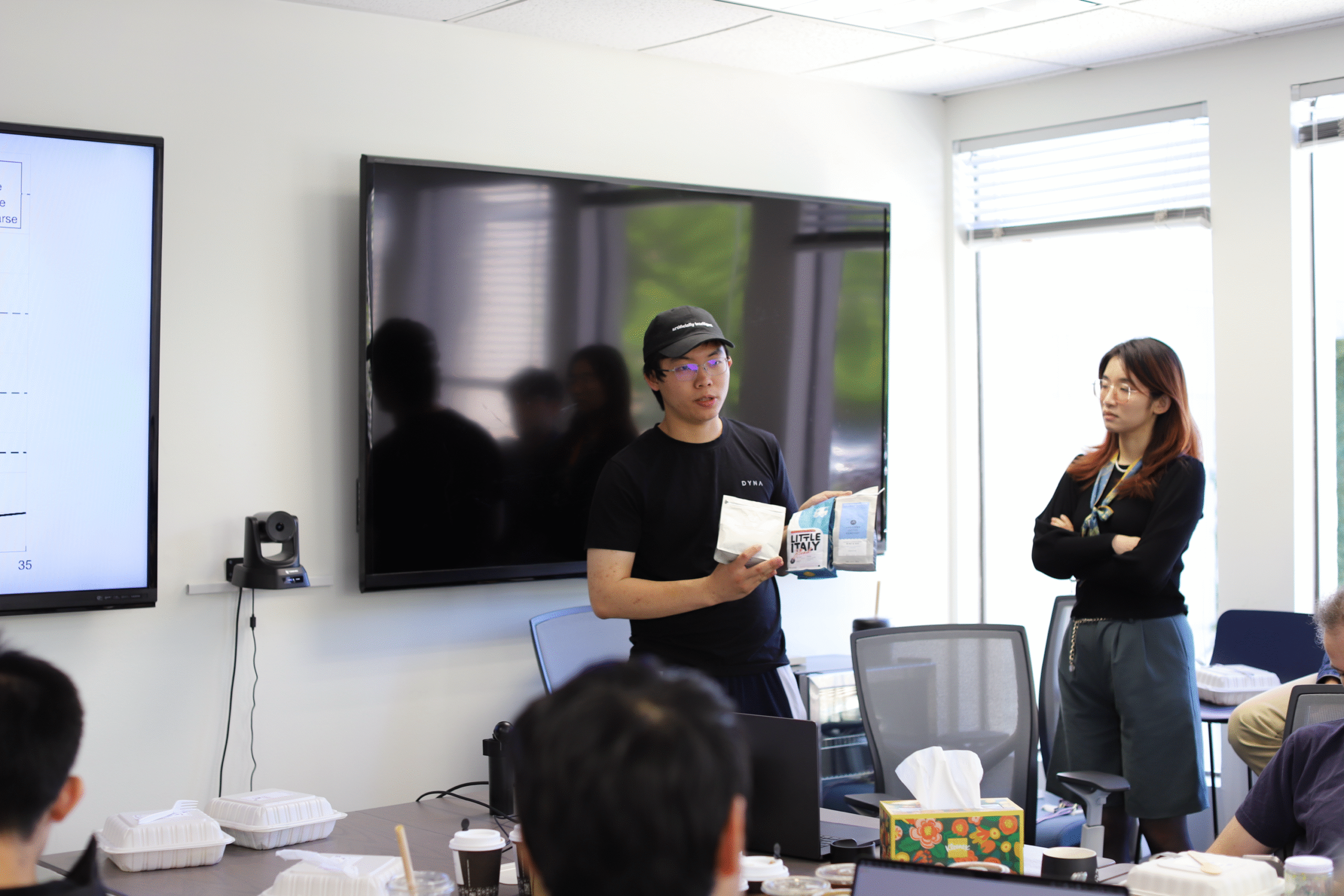
Compiled by Jillian Mallon
Caption for featured image: Robotics Master’s student Jie (Tony) Wang presenting to a group at his summer internship at Dyna Robotics.
Now that the Fall 2025 semester has started at Penn, current ROBO MSE and PhD students at GRASP might start thinking ahead to their plans next summer. When considering whether to apply for an internship, fellowship, or co-op, there are many questions that might arise, such as: “Will I be able to juggle my academic responsibilities with my internship role?” “Where should I look for opportunities, and how many should I apply to?” “Who do I contact at Penn once I receive an offer?” GRASP Staff spoke with six Robotics Master’s students and two GRASP PhD students who held research positions this summer to address some of our most frequently asked questions!
What was the name of the company that you interned for this summer? Was the internship local in Philadelphia, outside of Philadelphia, or virtual? Did you have to relocate for the internship?
Rhythm Chandak, ROBO MSE – ETH Zurich
ETH Zurich. It was an on site fellowship. I relocated to Switzerland for the fellowship.
Tianjiao Ding, PhD, MEAM – Amazon
I interned as a Research Scientist in the Artificial Intelligence Fundamental Research team at Amazon. I relocated to their campus in New York City.
Taher Kapadia, ROBO MSE – Qualcomm
Qualcomm.
Vignesh Lakshmanan, ROBO MSE – Suki AI
Suki AI. Palo Alto, California. Yes.
Vaibhav Thakkar, ROBO MSE – ArcBest Technologies
I interned at ArcBest Technologies. It was outside of Philadelphia in Fort Smith, Arkansas. I had to relocate for the internship.
Jie Wang, ROBO MSE – Dyna Robotics
Dyna Robotics, Inc.; Redwood City, CA. I needed to relocate to the Bay Area and the company reimbursed my travel costs.
Yifan Xue, PhD, MEAM – Honda Research Institute
Honda Research Institute.
Ethan Yu, ROBO MSE – OpenAI
OpenAI, based at their headquarters in Mission Bay (SF). Yes, I had to relocate.
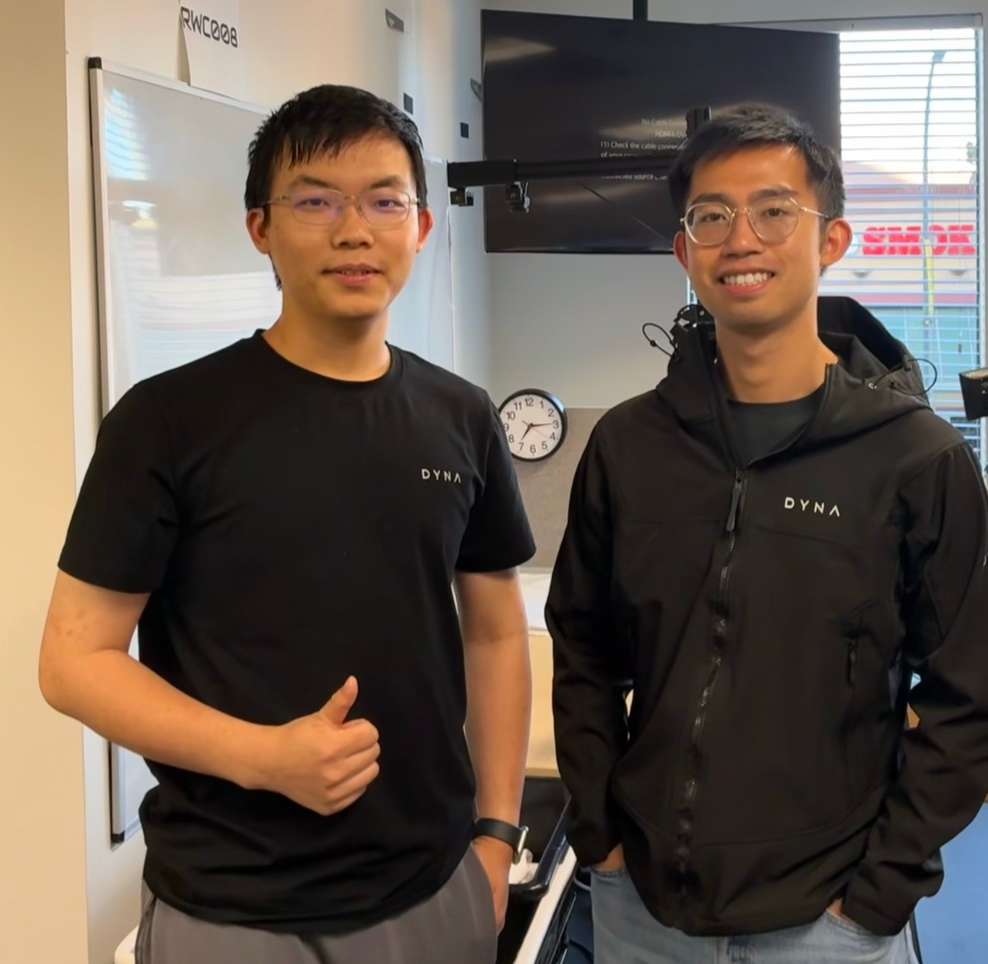
How and when did you first hear about the internship? What was the application/onboarding process like?
Rhythm Chandak, ROBO MSE – ETH Zurich
I heard it from a friend in February and the applications were due in the last week of February. For the application process, I had to write a Motivation Letter and take a couple of Letter of Recommendations and an updated CV, along with an official transcript.
Tianjiao Ding, PhD, MEAM – Amazon
I got interested in the publications from their team, so I reached out to the authors and got an internal referral.
Taher Kapadia, ROBO MSE – Qualcomm
I saw the internship posted on LinkedIn, went to the company’s website, and applied through their job portal.
Vignesh Lakshmanan, ROBO MSE – Suki AI
February 2025.
Vaibhav Thakkar, ROBO MSE – ArcBest Technologies
The application involved a single technical interview with a senior manager. The onboarding process was very smooth, probably because of the large scale and years of hiring experience of the company.
Jie Wang, ROBO MSE – Dyna Robotics
Jason Ma was my mentor at the GRASP Lab and he is the co-founder of DYNA. The application was quite smooth: I emailed my resume, completed an engineering interview and an HR interview, and then joined. The onboarding was simple: a checklist to set up infrastructure and train your own VLA model in Day Onem, which is very practical and exciting.
Yifan Xue, PhD, MEAM – Honda Research Institute
From GRASP’s email list. I got my only interview 1 week after I submitted my application on the company’s website and got an offer 2 weeks later.
Ethan Yu, ROBO MSE – OpenAI
I just applied through the general Emerging Talent application when it opened up last fall. It was a standard interview process.
How many other summer internship opportunities did you apply for, if any? Why did you choose the internship that you did?
Rhythm Chandak, ROBO MSE – ETH Zurich
I had applied to 4-5 internships, but after I got the acceptance from ETH, I decided to take it because it would have been a good experience to work at such a renowned university among some of the smartest people.
Tianjiao Ding, PhD, MEAM – Amazon
I applied for two others. I chose this internship because the team work on cutting-edge topics that align with my research, the interaction is engaging.
Taher Kapadia, ROBO MSE – Qualcomm
I applied for a few, but the one at Qualcomm had the most interesting work, so I chose to go there.
Vignesh Lakshmanan, ROBO MSE – Suki AI
A handful of other companies. I eventually chose Suki as I wanted to learn more and work on interesting problems at a mature, reputed start up on a great trajectory.
Vaibhav Thakkar, ROBO MSE – ArcBest Technologies
I applied for at least 8-10 internships, interviewed for a couple, and finally chose this offer. To be honest, this was the only offer I had, and it seemed like a great way to get some industrial robotics experience.
Jie Wang, ROBO MSE – Dyna Robotics
I applied broadly (around 50 positions), interviewed at several companies, and received three offers. I chose DYNA because the work was the most exciting and aligned with my research. I also trusted the team since many Penn alumni work there, and the compensation was competitive.
Yifan Xue, PhD, MEAM – Honda Research Institute
0. Because I got an interview and the offer only a short time after submitting my first application, I didn’t manage to spend time looking into other opportunities. And also because I am very interested in working on real-life autonomous driving projects, and the position offered by Honda matches my career dream.
Ethan Yu, ROBO MSE – OpenAI
I didn’t really keep count, probably around 10 others. I chose OpenAI because the project/team I was matched to seemed really interesting, and I knew that I would have the best resources there. Also, it would be an opportunity to do some LLM research, which I hadn’t done before.
Are you an international student? If so, did you participate in UPenn’s Curricular Practical Training (CPT)? Did you find the CPT process to be easy to navigate? Do you have advice for future international students regarding this process?
Rhythm Chandak, ROBO MSE – ETH Zurich
Yes, I am an international student, but since my fellowship was out of the US, I did not participate in CPT.
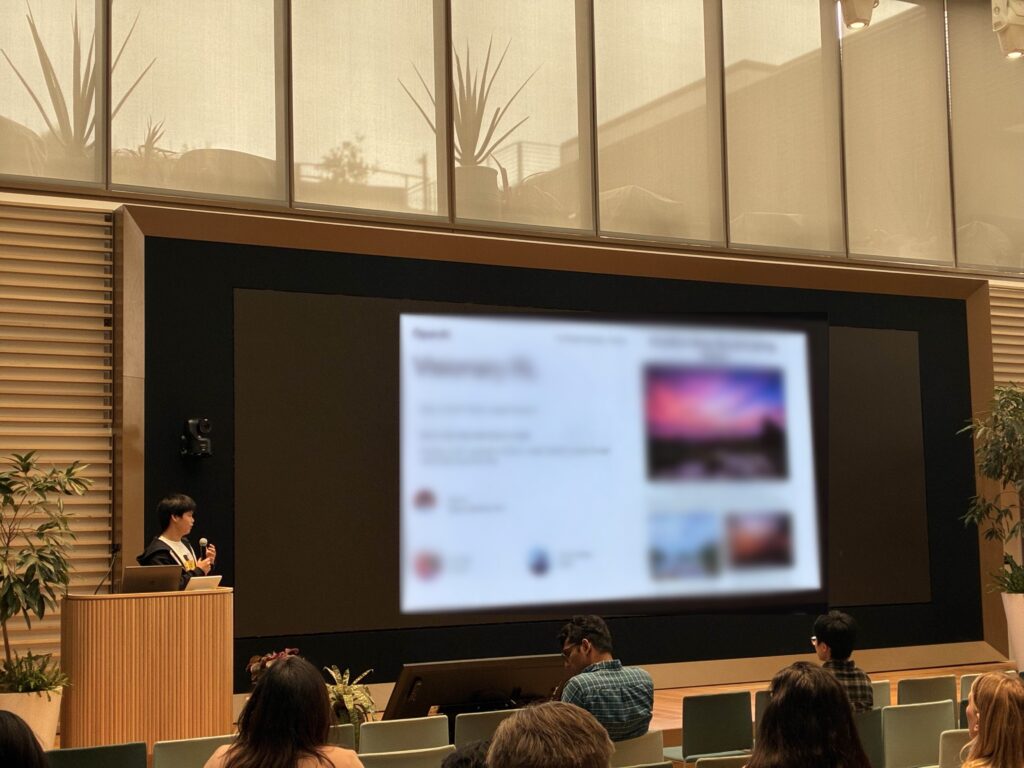
Tianjiao Ding, PhD, MEAM – Amazon
Yes to the first three questions. Since there are many administrative processes to go through from both sides, I recommend starting the process as early as possible even if you feel you do not have all the materials ready.
Taher Kapadia, ROBO MSE – Qualcomm
Yes, the CPT process was easy to navigate. I just followed the instructions available on the website.
Vaibhav Thakkar, ROBO MSE – ArcBest Technologies
Yes, I am from India and had to apply for CPT through ISSS office at UPenn. The process was very smooth and easy to navigate, and I am really grateful to Penn for that. My advice would be to get in touch with your program coordinater early on, get familiar with what will you need, explore the ISSS website for detailed steps. Special thanks to Mariel Celentano (our ROBO coordinator) for her help in the process.
Jie Wang, ROBO MSE – Dyna Robotics
Yes I am from China. I participated in CPT and it is easy to process. My advisor Prof. Dinesh Jayaraman is really supportive. It’s great that we don’t need to pay for the course, and remember to start applying to CPT early!
Yifan Xue, PhD, MEAM – Honda Research Institute
Yes, I am international and participated in CPT. The process is a little complex, but well-instructed.
What advice would you give to future GRASPees when looking for and applying to internships that fit their research interests?
Rhythm Chandak, ROBO MSE – ETH Zurich
I would recommend applying to fields you are interested in or something you have worked with. That increases the chance of getting an internship, given the current job market.
Also, start applying early and keep updating your CVs. Get in touch with some professors for RA positions and if they have any opportunities in their mind for you. Practice Leetcode. Revisit your coursework and the projects. Keep your fundamentals strong.
Tianjiao Ding, PhD, MEAM – Amazon
Look for papers from companies or institutes that align with your research interest. It helps you prioritize the choices, and it increases the chance of getting in by having matched interest and potential referrals.
Taher Kapadia, ROBO MSE – Qualcomm
Be selective about the opportunity you say yes to.
Vignesh Lakshmanan, ROBO MSE – Suki AI
Optimize for learning information deemed to be important over anything else. Opportunities will come as technical skills are developed.
Vaibhav Thakkar, ROBO MSE – ArcBest Technologies
Apply early, ask for referrals from seniors and professors in whose courses you performed nicely.
Jie Wang, ROBO MSE – Dyna Robotics
Startups like DYNA can be great opportunities to work on frontier research with lots of coding responsibility. If you are interested in scalable and impactful research, one tip is to look at job postings from big tech companies early. This helps you pick courses that align with future career paths.
Yifan Xue, PhD, MEAM – Honda Research Institute
I only had 1 application so my advice might not be the most useful, but I think companies do value applicants’ research experience in the field that they are hiring for. Highlighting your relevant research experience in the CV and cover letter is very important.
Ethan Yu, ROBO MSE – OpenAI
Definitely make industry connections, be it from conferences or classes. I’ve seen many people get their internships this way. Applying to as many as possible also doesn’t hurt.
What were your daily responsibilities at your internship? What field(s) of robotics would describe this internship (HRI, Machine Learning, Control, Programming, etc)?
Rhythm Chandak, ROBO MSE – ETH Zurich
I dealt with Computer Vision as I was working on Event Camera-Based SLAM for Autonomous Drone Navigation.
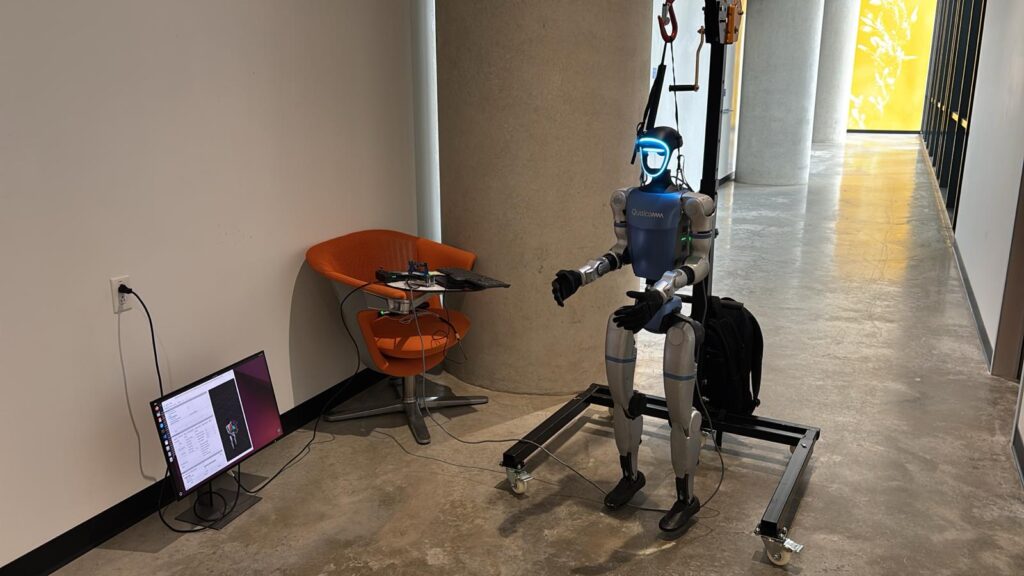
Tianjiao Ding, PhD, MEAM – Amazon
Machine Learning.
Taher Kapadia, ROBO MSE – Qualcomm
My internship was pretty varied. I explored various technologies like simulations, robotics arms, AMRs, AR VR, but my main project was working on humanoids, specifically the Unitree G1Q and enabling various robotic algorithms on Qualcomm chipsets.
Vignesh Lakshmanan, ROBO MSE – Suki AI
Machine learning. I worked on dictation efforts to facilitate the nurse-patient interaction and eventually filed a patent for my work. This entailed algorithm design, a bit of paper reading, and implementation.
Vaibhav Thakkar, ROBO MSE – ArcBest Technologies
My internship involved multiple fields of robotics, like Sensor Fusion, Perception, Deep Learning and C++ programming.
Jie Wang, ROBO MSE – Dyna Robotics
I worked on training and evaluating vision-language-action models. My responsibilities included literature review, building models, running large-scale training, analyzing performance, and keep improving for complex manipulation tasks.
Yifan Xue, PhD, MEAM – Honda Research Institute
I am working on the improvement of autonomous parking algorithms.
Ethan Yu, ROBO MSE – OpenAI
I interned on the (llm) post-training team – it was pretty much a consistent loop of dataset refinement -> finetuning -> eval/grader analysis -> repeat.
What were your working hours? If you did not have set hours, what was the structure of the internship? What was the duration of your internship?
Rhythm Chandak, ROBO MSE – ETH Zurich
9-6, but they were very flexible because I was working with a lab. I worked for 2 months.
Taher Kapadia, ROBO MSE – Qualcomm
The duration of my internship was 14 weeks and my working hours were 8:30-5:00.
Vignesh Lakshmanan, ROBO MSE – Suki AI
40 hours for ~3 months.
Vaibhav Thakkar, ROBO MSE – ArcBest Technologies
My working hours were from 9 am – 6 pm, and I interned there for 2 months.
Jie Wang, ROBO MSE – Dyna Robotics
It was common to start at least before 10:30 am, and hours were flexible. As researchers, we sometimes worked late to ensure experiments were running, including scheduling overnight GPU jobs. My internship lasted three months (June 2 – August 25), which is the maximum CPT allows.
Yifan Xue, PhD, MEAM – Honda Research Institute
8 hours a day, 40 hours a week for 14 weeks.
Ethan Yu, ROBO MSE – OpenAI
No set hours, just 14 weeks of work. I usually came into office around 9:30 and left at 6:30 after eating dinner there. Sometimes I worked a bit at home.
Do you feel like your time at GRASP helped to prepare you for the responsibilities of the internship? How so? If not, what could have prepared you better?
Rhythm Chandak, ROBO MSE – ETH Zurich
The courses at Penn like Machine Perception and Learning in Robotics helped me in gaining good foundational skills for working on the complete autonomy stack for robotic systems.
It could have been a bit better to have more hands-on hardware courses, for example implementing real time control systems for drones at high speeds or legged robots.
Vignesh Lakshmanan, ROBO MSE – Suki AI
Absolutely, the machine learning and rigorous math classes gave the fundamentals I needed to excel.
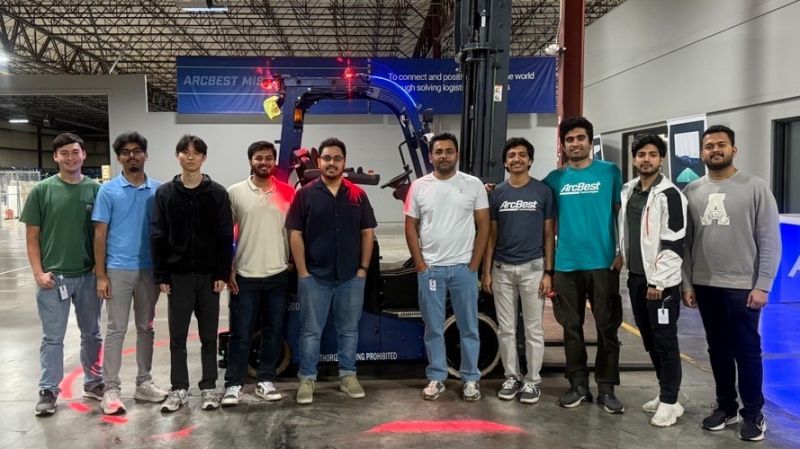
Vaibhav Thakkar, ROBO MSE – ArcBest Technologies
I am really grateful for GRASP to equip me with the skills and knowledge of developing and engineering complex robotics technologies along with a solid theoretical foundation for thinking from first principles.
Jie Wang, ROBO MSE – Dyna Robotics
Yes of course! GRASP Lab is a great place where I learned a lot on frontier robot learning. For example, before joining DYNA this summer, I have already been playing with generalist VLAs like pi0 in the lab. Doing serious evaluation and rethinking hard on it builds me a good foundation about what’s the next problem to solve and where is the bottleneck. Doing research at GRASP Lab with Prof. Dinesh Jayaraman actually feels quite similar when you are working at frontier research industry, and I benefitted a lot from the CIS519 Applied Machine Learning course too.
Ethan Yu, ROBO MSE – OpenAI
Prior research experience at GRASP definitely helped with the research day-to-day, since it helped with cultivating the sharp research thinking that is important in research.
What was your favorite part of your internship?
Rhythm Chandak, ROBO MSE – ETH Zurich
I had a lot of freedom to explore the approaches I wanted to. Also, since it was in Switzerland, I got to see a very beautiful country. :))
Taher Kapadia, ROBO MSE – Qualcomm
The variety.
Vignesh Lakshmanan, ROBO MSE – Suki AI
Meeting the company’s C suite. Having the opportunity to gain insight on Suki’s current and future plans provided rare, valuable learnings.
Vaibhav Thakkar, ROBO MSE – ArcBest Technologies
The best part was the hands on experience with a production ready autonomous forklift. Testing it in a real warehouse and understanding the challenges.
Jie Wang, ROBO MSE – Dyna Robotics
My favorite part was meeting the lovely people at DYNA. It is relatively small, but a very great time. I like the atmosphere where everyone sticks together, having ownership on their project and grinding super hard for a common goal. What’s more, it is my fortune to learn from people there. They were senior engineers / top research scientists / enthusiastic undergrad interns…. I really learned a lot on how to find a market segment and deliver first level innovative products there.
Yifan Xue, PhD, MEAM – Honda Research Institute
Free drinks and food.
Ethan Yu, ROBO MSE – OpenAI
Food – breakfast, lunch, and dinner were covered. Also with how open the communication channels in the company were – you could pretty much message anybody, even executives, and they’d be willing to meet.
Do you feel like you gained any skills at your internship that you plan to incorporate in your future research and studies at Penn? Do you feel like your internship helped prepare you for your future career in academia or industry?
Rhythm Chandak, ROBO MSE – ETH Zurich
I gained practical and hands-on experience on working with state of the art perception stack and hardware. Also, the constraints of making it real time helped me in understanding the important data structures and implementation trade-offs in software engineering. These skills will be very helpful for my future career in the industry.
Taher Kapadia, ROBO MSE – Qualcomm
The most important thing I learned was cowriting cleaner and more efficient code, not honing down on a bug and looking at the bigger picture.
Vignesh Lakshmanan, ROBO MSE – Suki AI
Yes, I developed better programming and algorithmic acumen.
Vaibhav Thakkar, ROBO MSE – ArcBest Technologies
The best part about working on engineering of complex robotic platforms is you get efficient in debugging and reverse engineering the entire autonomy pipeline. That skill will remain with you for life, irrespective of which path you take.
Jie Wang, ROBO MSE – Dyna Robotics
Yes it’s a lot! I learned how to train, analyze and evaluate VLA models and my project is strongly related to my research interests. I will keep grinding on projects in the same spirits back at Penn. The internship was absolutely a great help on my future career. I am seeking a Robotics PhD this year, and to potentially build my own startup in the future!
Ethan Yu, ROBO MSE – OpenAI
Mainly just the realization that the small differences matter, and to not be discouraged if you don’t have any results yet, because the breakthrough is probably just one or two small tweaks away.
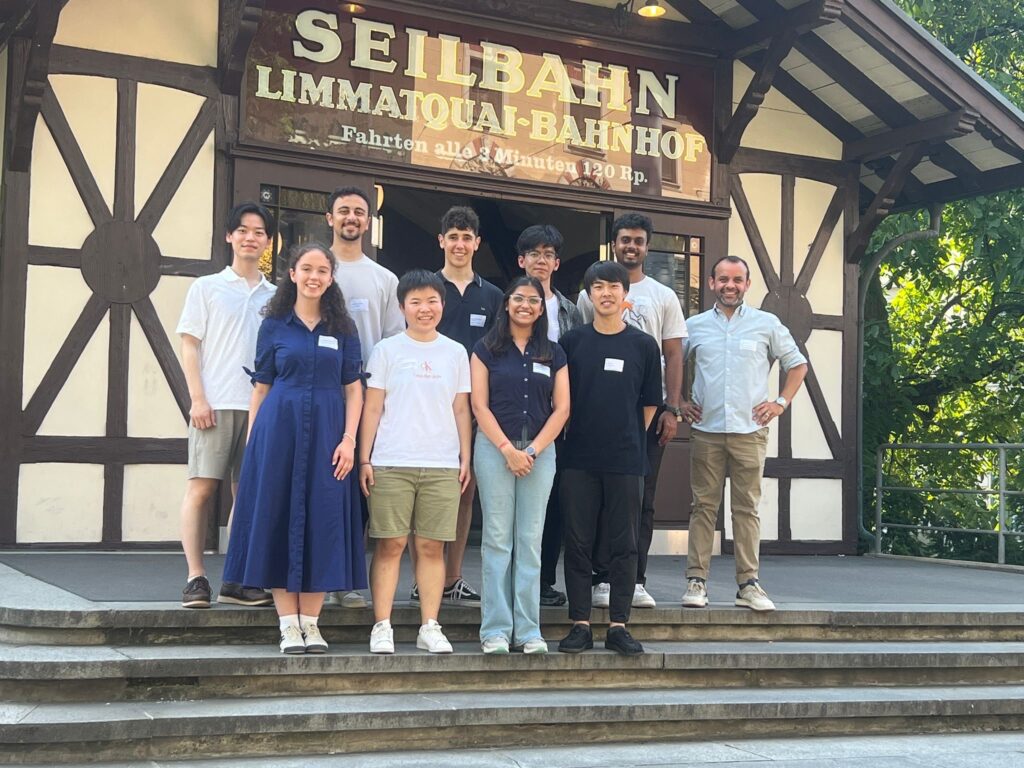
Do you think that your internship had any influence on what type of job you might be interested in after you graduate from Penn?
Rhythm Chandak, ROBO MSE – ETH Zurich
Yes, I would appreciate research roles in the industry after I graduate.
Tianjiao Ding, PhD, MEAM – Amazon
Yes! I have a more concrete understanding of doing research in the industry: the pace of iterations, the value, and the vision.
Taher Kapadia, ROBO MSE – Qualcomm
Yes.
Vignesh Lakshmanan, ROBO MSE – Suki AI
Working in the healthcare industry taught me there exists many pertinent problems in the world for engineers to move towards.
Jie Wang, ROBO MSE – Dyna Robotics
Yes, I want to keep working on robotics manipulation and doing scalable research, which is closely related to robot learning in academia / industry. It reinforced my confidence and certainty on my next steps.
Ethan Yu, ROBO MSE – OpenAI
Yep, heavily considering going back instead of the usual academia route.
Did you make any connections or start any collaborations within this company that you plan to continue past this summer?
Rhythm Chandak, ROBO MSE – ETH Zurich
I can go there for PhD if I decide to pursue it.
Taher Kapadia, ROBO MSE – Qualcomm
Yes.
Vignesh Lakshmanan, ROBO MSE – Suki AI
Yes. I became good friends with my manager as well as many others at the company.
Vaibhav Thakkar, ROBO MSE – ArcBest Technologies
Of course, I made lots of good connections. I plan to continue working with them part-time in the fall semester too.
Jie Wang, ROBO MSE – Dyna Robotics
First of all, I made a lot of friends at DYNA. We will keep in touch, go travel, and collaborate on research. Secondly, the Bay Area is an amazing place that pools great talents and people with passion. I have visited many frontier research centers and companies. It is great to chat and learn from these people!
Ethan Yu, ROBO MSE – OpenAI
A few other Open AI interns and I are thinking of starting an AGI club here, with potentially some talks from industry.
How did you balance the duties of your internship with your research at Penn and other responsibilities?
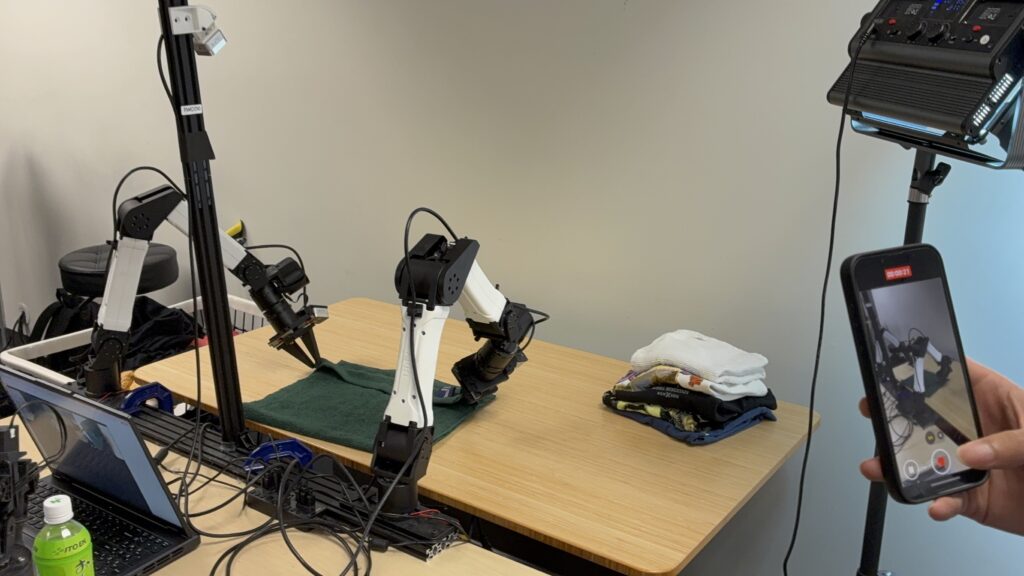
Rhythm Chandak, ROBO MSE – ETH Zurich
I did not have any research ongoing at Penn during the summer, but I had to read some papers and work on my thesis proposal for my second year. I used to work on it on the weekends or after the office hours.
Vignesh Lakshmanan, ROBO MSE – Suki AI
Usually I would work on research after work and take a day of the weekend off.
Vaibhav Thakkar, ROBO MSE – ArcBest Technologies
This was the only full time job I had during the summer. Other than the work, I played a lot of football and outdoor activities to maintain my physical and mental health.
Jie Wang, ROBO MSE – Dyna Robotics
Balancing was challenging since research and engineering deliverables required focus. However, the alumni connection between GRASP and DYNA makes it easy to continue collaborations after returning to Penn.
Yifan Xue, PhD, MEAM – Honda Research Institute
I found it challenging to work on Penn research while working full-time as an intern. I only had time to attend Penn meetings during weekends.
Ethan Yu, ROBO MSE – OpenAI
To be honest, I shirked my research responsibilities a little bit because the internship took up so much time.
Would you recommend your internship to future GRASPees?
Rhythm Chandak, ROBO MSE – ETH Zurich
I would highly recommend it.
Tianjiao Ding, PhD, MEAM – Amazon
Absolutely! I am incredibly grateful for the experience to work with my manager and mentors, and getting help from other team members.
Taher Kapadia, ROBO MSE – Qualcomm
Definitely.
Vignesh Lakshmanan, ROBO MSE – Suki AI
Absolutely.
Vaibhav Thakkar, ROBO MSE – ArcBest Technologies
Definitely, I would recommend everyone to get an experience in industry, to understand the real challenges in deploying and developing robotics autonomy stack and ArcBest is a good place to get that practical industrial experience.
Jie Wang, ROBO MSE – Dyna Robotics
Yes, it is a great opportunity for anyone who is ambitious and determined to work on scalable robot learning. We make robots work, and you can do both frontier research and solid engineering. You are welcome to join! Please check the website for potential positions: https://dyna.co/. I am glad to refer GRASPees for full-time / internships. Please contact my email.
Yifan Xue, PhD, MEAM – Honda Research Institute
Yes. Interns will be able to work on heavily real-life-project oriented research at HRI. I get to better appreciate why some robot behaviors are feasible in theory (for example, driving backwards) but should never be allowed in real-life autonomous driving tasks.
Ethan Yu, ROBO MSE – OpenAI
Yes, I learned a lot.
Featured People
Robotics MSE
PhD, CIS
Robotics MSE
Robotics MSE - Accelerated Master's
Robotics MSE
Robotics MSE
PhD, MEAM
Robotics MSE - Accelerated Master's
